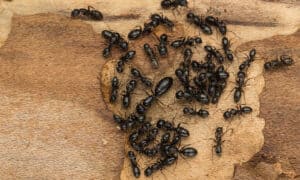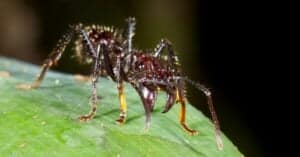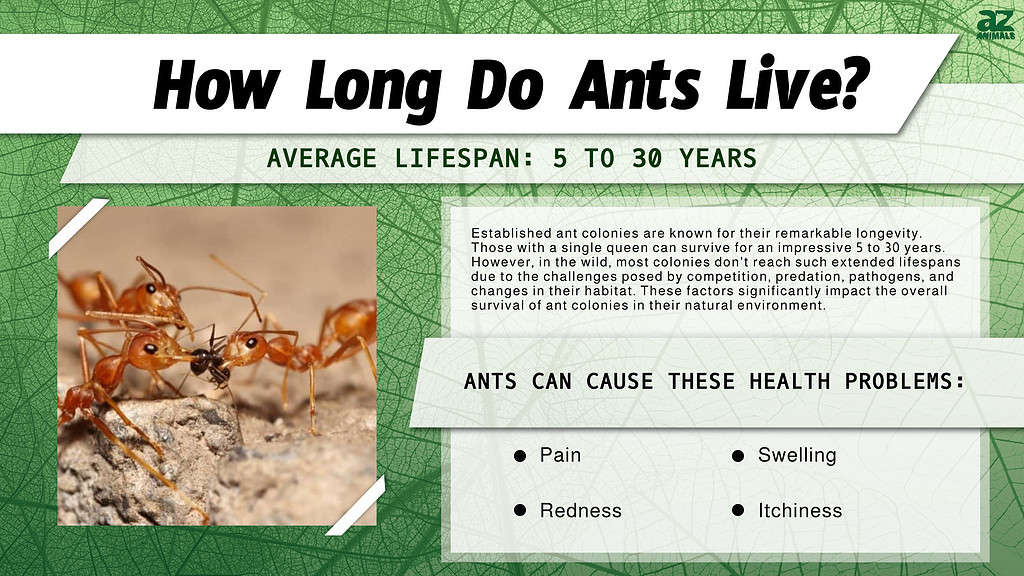
Found around the world in gardens and parks, ants are unnecessary pests in just about everyone’s life. While we may notice these creatures crawling around on our kitchen counters, have you ever thought about how long do ants live?
From queen ants to simple worker ants, the answer to the question how long do ants live may surprise you. But what is their life like, from beginning to end? And how is their lifespan compared to other insects? Let’s learn more about ants now.
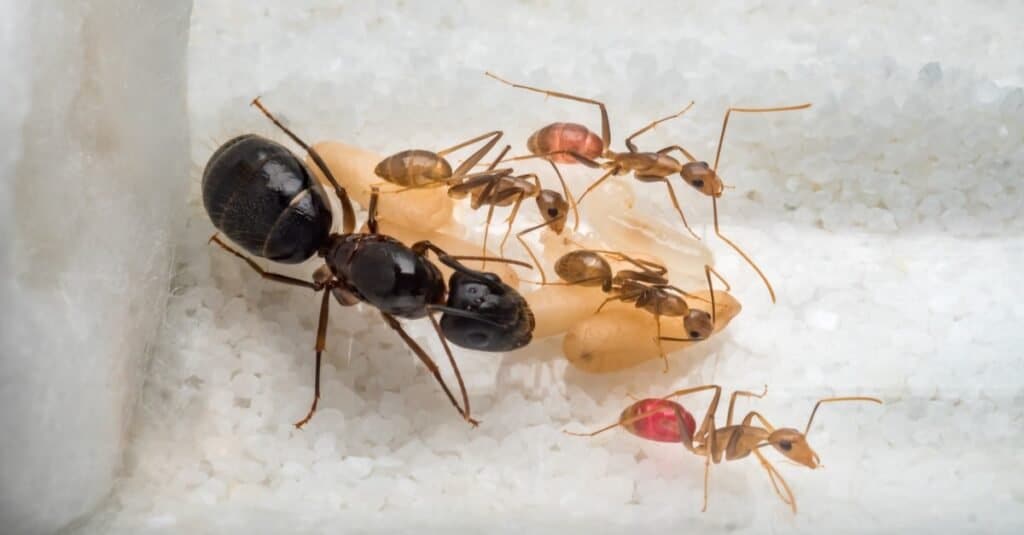
Male ants live the least amount of time, existing only to breed with female ants before dying after a few weeks.
©Poravute Siriphiroon/Shutterstock.com
How Long Do Ants Live?
These insects live anywhere from a few weeks to multiple decades, however, ants’ lifespans depend on their gender and status in their colony. For example, male ants live the least amount of time, existing only to breed with female ants before dying after a few weeks.
Female working ants live for a few months at a time, working in the colony and being of service to their queen until passing. And finally, an ant colony’s queen can live many years, some as many as 30 years old!
Among the 13,800 ant species, which ones live the longest? It might surprise you to learn that one of the longest lifespans comes from the black garden ant (Lasius niger). Queen black garden ants have been observed living up to 28 3/4 years in lab settings.
Another long-lifespan ant is the western harvester ant (Pogonomyrmex occidentalis), which has been studied in the wild with estimates of queen lifespans reaching 14 to 30 years!
Given the size and general insignificance of ants, this answer may surprise you. However, there is only one queen per colony, so most ants only live a few weeks total, although the worker ants of some species can reach ages of 7- 8 years. But that doesn’t make their life cycle any less interesting. Let’s learn about that now.
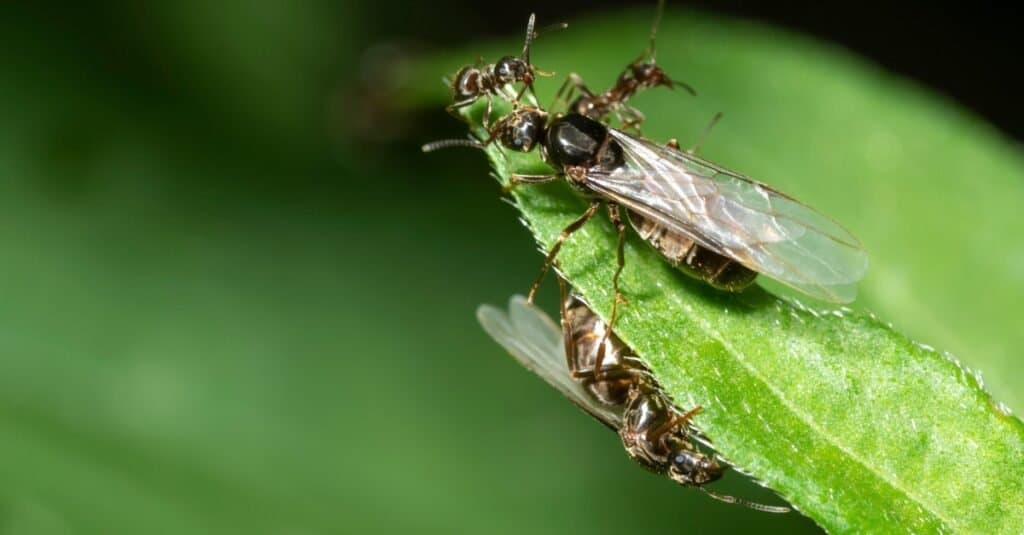
©Janny2/Shutterstock.com
The Average Ant Life Cycle
From beginning to end, male-to-female, ants live a fairly interesting life. If you’ve always wondered what it’s like to be an ant, read on to learn more!
Eggs
Like most insects, ants begin as eggs. A colony’s queen lays the eggs exclusively, and fertilized eggs will become female working ants. All unfertilized eggs become male ants, and these ants are only useful for mating with the queen.
Eggs will hatch after a few weeks, depending on the species of ant. There isn’t much else going on for ant eggs, as they are essentially dormant until the next stage of their life.
Young Ants (Larvae and Pupae)
When it comes time, young ants emerge from their eggs as small worms, also known as larvae. This is one of the most important stages of life for the ant, as they will be fed constantly by other working ants in order to stay alive.
Larval ants go through many different pupating stages, growing bigger and bigger after each pupation. They begin to look more like the ants we know today, and this process also determines what female ants will become queens.
A determining factor for other queen ants usually has to do with how much the ant has been fed. Strong and large female ants will develop wings. This allows them to fly off when they are adult age and start their own colony.
Ant pupae are usually lighter in color than the common black ants, and they will remain in this state of being for at least a week, if not closer to a month. They do not have their antennas yet, and will darken in color with each pupation stage.
Adult Ants
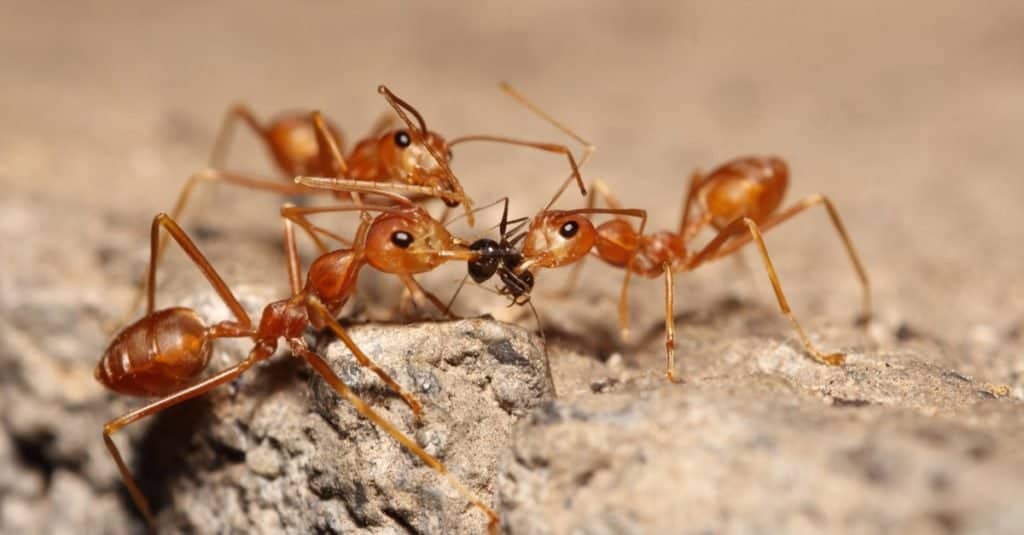
An ant’s life path is determined long before it reaches adulthood.
©sarawuth wannasathit/Shutterstock.com
Once an ant fully emerges from its pupation stage or cocoon, it is fully grown and will remain the same size for the rest of its life. The entire process can take a month or two, which means that most male ants are growing up longer than they are allowed to be adults.
An ant’s life path is determined long before it reaches adulthood. While this may seem cruel, this is the beauty of Mother Nature. Let’s learn about how ants compare to other insects in terms of their quality of life.
How Does Their Lifespan Compare to Spiders?
Overall, ants tend to live a much shorter lifespan than spiders do. Many spider species live at least a year, if not closer to a whole decade, and this is true for all members of the spider species, not just their leader or queen.
(In fact, the oldest spider on record reached the incredible age of 43 years old!)
Many female spiders live longer than male spiders, whether it be through their size and abilities or simply that the male often dies or is eaten during the mating process. This is similar to an ant’s life span, given that the female working ants live a few months longer than male ants.
However, spiders definitely live longer overall. Some spider species, such as the tarantula, can live to be decades old. Plus, many spiders no doubt eat ants as part of their sustenance and daily life. Ants are a necessary part of nature, but that does not mean they live very long!
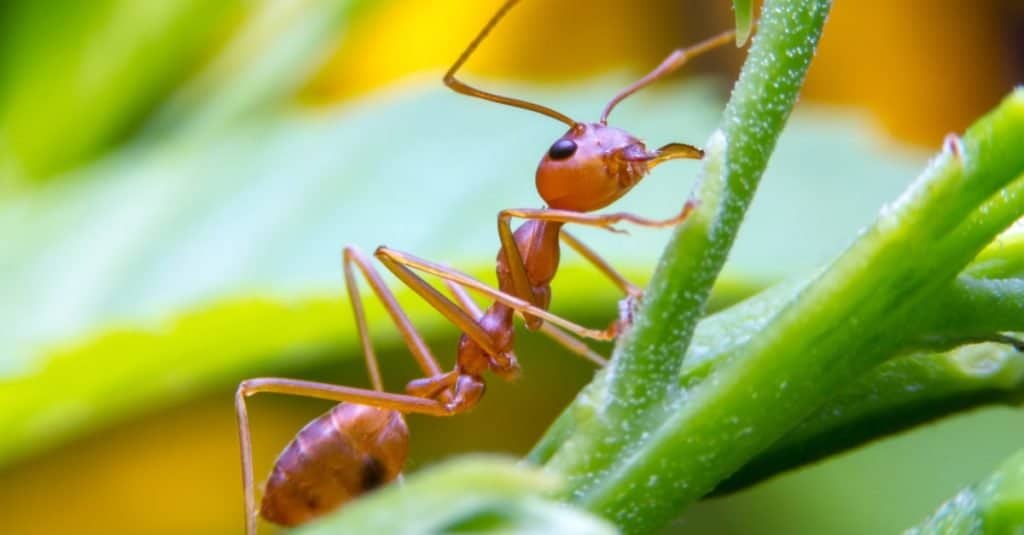
Fire ant colonies are typically comprised of female worker ants and one queen, who is responsible for laying the eggs.
©wnarong/Shutterstock.com
Male Ant Lifespans VS Female Ant Lifespans
One of the most unique things about insects in this category is the fact that ants’ lifespans are influenced by their gender. Male ants are largely considered to be just there for breeding with their queen, and many male ants won’t even get the opportunity to do this.
Female ants will either live longer as workers, taking care of the colony and any young ants. Or they will become queens, and have the opportunity to live for multiple years. Queen ants are well taken care of, which no doubt leads to their quality of life.
It is easy to identify a queen ant when compared with the rest of her colony. She will be far larger, have wings, and many other ants will be paying attention to her. This is likely because she is laying eggs that need attending to, and her colony is responsible for feeding her and keeping her clean. What a small and awesome life!
The photo featured at the top of this post is © Poravute Siriphiroon/Shutterstock.com
Thank you for reading! Have some feedback for us? Contact the AZ Animals editorial team.





